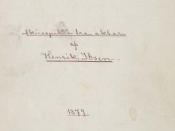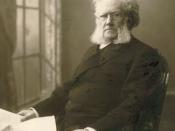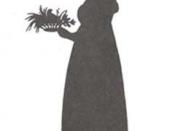"A Doll's House" Henrik Ibsen's "A Doll's House" is a classic piece of literature that deals foremostly with the issue of women's role in society. It occurs around a central character, Nora, and her relation to the exterior world. Nora serves as a symbol for the women of the time; women who were thought to be content with the luxuries of modern society. She is presented to the audience as nieve and sheltered. Indeed, there is much truth to this. However she is in no way a static character, and by the end of the play she is ready to go discover who she truly is.
Nora's personality as a whole is not unlike that of a child. Even as a mother she's content to romp around with her children as if she were one of them and leave the real parenting responsibility to the nurse.
Nora's distorted vision of the world is made even more evident through her conversation with her old school friend Christine. While Christine is wizened and somber, Nora is impetuous. In fact it is only after Christine calls Nora a child that Nora reveals to her the secret she's kept so clandestine all these years. Even then, she seems to be narrating in the style of a boastful child rather than a thoughtful adult.
Torvald, on the other hand, is the king of his castle, and while he loves his wife dearly he treats her more like a father would than what a husband should his wife. Torvald's treatment of her as a small helpless child only contributes to Nora's isolation from reality. Just as Nora sees her world through material objects, Torvald sees Nora as an object to be possessed. This becomes most evident throughout the play but no...


